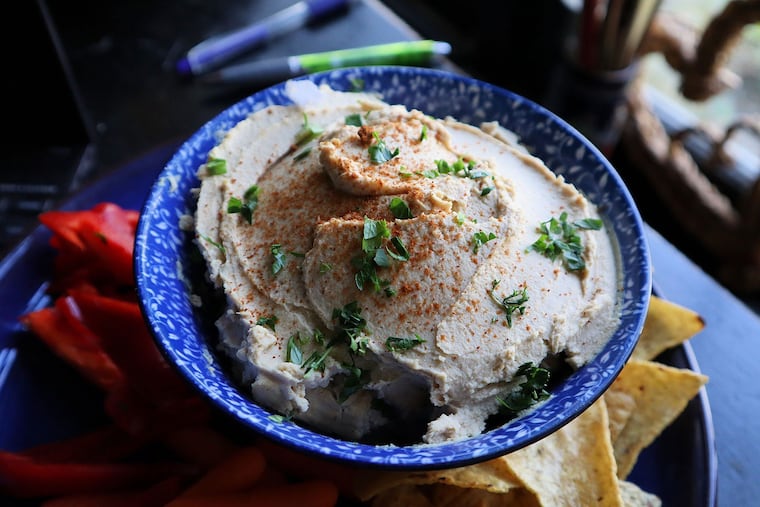For a weary schoolteacher, there’s solace in comfort food — and gratitude for those who prepare it | Opinion
Time and again, tragedy, burnout, and community trauma have prompted Lydia Kulina-Washburn to search for the perfect pita. At a Center City restaurant, she may have found that — and something more.

As I write this op-ed, I’m crying over a falafel salad at Michael Solomonov’s Goldie in Center City. My place setting is filled with the crumbs of toasted sunflower seeds; the juice of fermented beets and the tang of lemon date vinaigrette threaten to destroy my keyboard. Somehow, the salt stains on my lips from the last few hours of shedding tears accentuate the flavor profile of the dish.
I am neither a food critic nor a restaurateur — I am a teacher in Philadelphia.
This week, on top of being punched while separating two volatile teenagers, and covering classes for absent teachers, I had to mentally prepare for school threats because of a TikTok trend. So, once again, I find myself at my favorite hummuseria.
My chickpea vice began like most addictive sensations: I was where I shouldn’t be. It started five years ago, when, despite mountains of comprehension tests to grade, I traveled downtown on a whim and visited Dizengoff. The whim was ill-advised: I did not have a voice after teaching over a ventilation system, and I should have used the 11 odd dollars I spent on Hummus Tehina for my graduate school textbooks.
Still, I tried to make my hummus order, with extra pita and beets — and maybe, if the cook didn’t mind, a cup of hot water. I pointed to my throat and tried to explain my condition: “Teacher, no voice, North Philadelphia, tired.” Any therapist worth his or her weight would have noted the distress in my body language and the years of trauma in my eyes.
Teacher burnout is not a sudden pandemic issue, as headlines would suggest. For decades, the Philadelphia School District has consistently been the subject of controversy. The majority of its schools are classified as Title 1, meaning they received federal government assistance as a result of their high percentage of low-income students.
In 2001, the state took oversight of the large urban district after its repeated inability to demonstrate progress. During this time, the large district was the site for rampant restructuring that drained money away from classrooms. For the last few decades, teachers have been working in taxing conditions, including overcapacity classrooms and inadequate staffing — and the headlines are just the tipping point. The Inquirer reported in 2018 that many city classrooms are filled with toxins such as lead paint and asbestos. It is no wonder that a recent study found that a quarter of the teachers at some schools exited within 12 months of arriving. Too many times, I would come home and collapse, too exhausted to move.
So over the years, I have sought moments of comfort when I could find them. Five minutes after placing my order at Dizengoff, the cook hurriedly brought me my hummus platter, along with an extra tray. To my surprise, the tray contained a six-piece porcelain tea set fit for Queen Elizabeth herself — lemon, tea, kettle, cup and saucer, and a pitcher of cream. I was flabbergasted.
» READ MORE: 'Zahav' is James Beard's cookbook of the year
After the initial shock of seeing my spread, a warm feeling filled my belly — and my heart. For the first time in my teaching career, I felt seen and heard. For once, the listeners’ response to my occupation was not a comment about my supposed sainthood. (I am not a saint, just a professional who wants to be treated as a professional.) It was not a comment about bravery. It was not a question about school violence. It was just subsistence for another day.
I never thanked the cook fully. But I have come for Israeli comfort food again, and again, and again — perhaps for that sense of wholeness that I felt in the intermingling of hot tea and chickpeas. Time and again, tragedy, burnout, and community trauma have sent me searching for the perfect pita.
A year ago, I saw a picture of the cook who brought me the tea. The kind chef was none other than Michael Solomonov himself. Solomonov owns Zahav, authored an award-winning cookbook, made chicken and doughnuts a Philadelphia meal staple, perfected the tehina shake, and is an icon of Israeli cooking. But he still found time to help uplift a tired teacher.
I have been thinking about Solomonov’s tea and chickpeas as we approach the end of this difficult year and brace for the possibility of another shutdown. Food has the capacity to nourish our souls as much as it does our bodies. Over the past two years, many eyes have been opened to the problematic systems at work in society: structural racism, sexism, misinformation. It can be overwhelming. But fixing systems can begin with helping individuals fix themselves — and often, especially in these trying times, that can be achieved by doing something as simple as just fixing them a plate.
Lydia Kulina-Washburn is an educator in West Philadelphia. Follow her here.